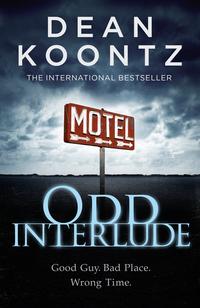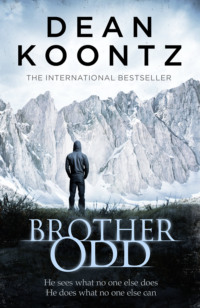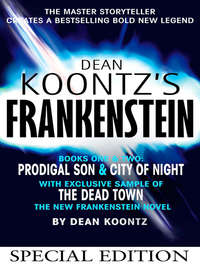
Полная версия
Ashley Bell
“Often, yes. That’s why I want to study Bibi’s test results more closely before deciding what we might do to extend her life.”
Although she gripped the table tighter than ever, Nancy felt as if she were floating away on a tide of despair as real as any flood waters. “Extend her life?”
There were lustrous depths in the physician’s eyes, and in those depths coiled a knowledge that suddenly she didn’t want him to share with them.
Dr. Chandra looked down at the table, at Murph, at Nancy once more, and said almost in a whisper, “It pains me to tell you that there is no cure. Survival time from diagnosis averages one year.”
Nancy could not breathe. Could not or didn’t wish to breathe.
“But with chemo and radiation?” Murph asked. “What then?”
The oncologist’s compassion was so evident, his sympathy so tender, that though Nancy irrationally wanted to hate him for what he revealed next, she could not muster even anger. “One year is with chemo and radiation,” Sanjay Chandra said. “And your daughter’s cancer is already very advanced.”
11
A Time When She Believed in Magic
AFTER SHE WOKE FROM HER NAP, BIBI FRESHENED up in the bathroom. Her face in the mirror surprised her. Sparkle in the eyes. Color in the cheeks and lips without benefit of makeup. She continued to look better than she felt, to the extent that she might have been staring not at a looking glass but into a parallel dimension where another, healthier Bibi Blair lived without a serious concern.
Having developed an appetite, she made her way back to bed to wait for the return of her parents and for dinner. The tingling along the left side of her body had grown less intense. The weakness in her left hand diminished, and not once did she find herself dragging her left foot. In the past few hours, she hadn’t suffered a recurrence of the foul taste.
She knew better than to conclude that the subsidence of her symptoms meant her affliction, whatever its cause, must be temporary. In spite of all its myriad wonders and its exquisite beauty, this world was a hard place; the comforts and joys that it offered, all the sublime moments, were purchased by days of quiet anxiety, by anguish, and by suffering. Such was the world that humanity had made for itself. Thus far in her life, she had enjoyed much more bliss than melancholy, more success than adversity, and she had for some time known that eventually she, like everyone, would have to walk through a fire of one kind or another. As long as she had a chance of coming out the other end intact, she would spare everyone her complaints, and she would not waste energy wishing for a magical resolution to this current plight.
For a while in Bibi’s childhood, she had believed in magic. A popular series of novels about young wizards mesmerized her, though certain other books had an even greater impact. Also, a few events in her life had suggested otherworldly presences, both light and dark. The dog, Olaf, came to her as if by magic, just when she needed him. And both before and after the golden retriever’s arrival, there had been incidents in the apartment above the garage that had seemed supernatural in nature.
Those experiences were long past, and time tended to cloud the shine on everything that had been wondrous in childhood. When she recalled those events, the once-shimmering mystery of them was now tarnished silver, and it became possible to suppose that there were logical explanations for what had happened back then.
When the dinner tray arrived at 5:15, she found the meal to be at such odds with the conventional image of hospital food that it almost renewed her belief in magic. A thick slice of meatloaf, creamy mashed potatoes, a little disposable foam thermos of hot gravy, mixed vegetables that didn’t taste as if they came out of a can … She tucked the paper napkin in the neck of her pajama top and ate with the enthusiasm of a hardworking lumberjack.
She was relishing the cherry cobbler and hot coffee when her parents at last returned. They were like two clever imposters, formed out of the goop inside an extraterrestrial seed pod, alike in every physical detail to the real Nancy and Murphy, but not quite able to get their attitudes and mannerisms correct. They smiled too much, and none of their smiles seemed genuine. All of Bibi’s life, her mom and dad had been blithe spirits. Now they seemed to be wired to bomb timers.
She wondered if they knew something that she didn’t. Probably not. Most likely, her hospitalization and disturbing symptoms were more than enough to leave Nancy and Murphy as unsettled as they were now. Go with the flow always proved to be a philosophy that worked only until the flow washed you up against a crisis so large it blocked the stream. The dears were at the moment both adrift and stranded.
Anyway, if they did know something bad, Bibi didn’t want to hear it from them. They would divulge it with too much emotion, and she would have to console them. When she met with Dr. Chandra in the morning, she wanted a calm environment and a clear head. Whatever was wrong with her, she would need to think, to understand her options. She would need to find the right door out of this dark place or, if her situation was more dire than she now knew, slip through the eye of Death’s needle and away before he sewed her into a shroud.
When it became clear that her parents might hesitate to leave when visiting hours ended, Bibi pretended to be falling asleep even as the hospital bed held her in a sitting position. They were at last set in motion by the lubrication of kisses, hugs, and reassurances.
Bibi missed them the moment they left the room, but she didn’t call them back. Alone, she took the drawstring bag from the nightstand and from it retrieved a small spiral-bound notebook and a pen. She wasn’t in the mood to read the paperback that she had brought, and the TV had no appeal. Instead, in neat cursive, she recorded the events of the day, with special attention to everything that she had felt and thought with each unsettling development. What most intrigued her, for reasons she could not quite define, was that she had harkened back more than once to those years in the Corona del Mar bungalow, when as a young girl she had believed in magic.
12
Twelve Years Earlier
Footsteps of a Man Unseen
EARLY ON A SUNDAY MORNING IN FEBRUARY OF that rainy winter, six weeks before the dog came dripping and nameless along the sidewalk from the sea, Bibi Blair took one of the spare keys to the apartment off a Peg-Board in the pantry, quietly left the kitchen, and eased the door shut as she stepped onto the back porch of the bungalow.
Her parents were sleeping late, which they often did on this first morning of the week. Nancy had no open houses to oversee, as she did on some Sundays. And in this off-season, Pet the Cat welcomed shoppers only Monday through Saturday. They had been out well past midnight with friends, leaving Bibi in the care of Chastity Brickle, an insufferably self-absorbed fifteen-year-old babysitter who had no doubt already—and more than once—failed to live up to her first name. They would not stir for another couple of hours.
Rain had fallen before dawn. Now the low gray sky looked more like ashes than like a scrubwoman’s sodden rags. Bibi didn’t bother with an umbrella but quickly wended her way among the puddles in the brick-paved courtyard, to the garage at the back of the property.
At the top of the open stairs, standing on the balcony, she looked back and down upon the bungalow, half expecting to be caught. Her mom and dad were unaware that she spent time in the apartment, and although there was nothing shameful in what she was doing, she preferred that they never learned about those visits.
The front door opened on a small kitchen. Blue Formica counters. Blue-and-gray speckled linoleum floor. A dinette table and two chairs. Last year’s wall calendar revealed the page for November. Although the digital clock on the microwave oven glowed with the correct time, the refrigerator did not hum, having been turned off weeks ago. The air was still and cool and faintly musty.
Bibi never turned on the lights, lest they reveal her presence even in the daytime, which they would have done on this dim morning. Although lacking blinds, the two kitchen windows admitted only gray light as feeble as misted moonglow.
In the center of the table stood the round, narrow-necked white vase, from which had often flowered a few roses or carnations. The vase stood empty, its glaze softly radiant in the gloom, as though it might be a milky crystal ball placed there for a pending séance.
She stood staring at the floor beside the first chair, where the dead body had been found. All the blood had been cleaned up long ago, but Bibi thought—imagined?—that the faintest trace of it remained on the air, a cruel smell. She wrinkled her nose in repugnance.
This place had no charm anymore, and after these visits, she felt sad and unsettled. Sometimes bad dreams followed. Yet she kept returning. She didn’t fully understand what drew her there. She would never find anything to make sense of what had happened. It just was what it was, her parents said, and of course they were right.
In addition to the kitchen, the apartment included a living room and bedroom, both furnished, plus a bath and a walk-in closet. She usually toured the entire place, alert and observant, and yet as if she were half in a dream state, seeking she knew not what. On this occasion, however, as she crossed the kitchen toward the living-room door, which stood slightly ajar, she halted at the thump of footsteps elsewhere in the apartment.
Both the bedroom and the living room featured hardwood floors that were less than half covered with area carpets. The tread sounded like that of a large man, and a few floorboards creaked under weight, not with every step taken, but often enough to confirm that these were indeed footsteps in the apartment rather than a noise from outside.
In spite of the fact that she had been the one who found the body back in the day, Bibi was not at first alarmed, only intrigued. Just then she realized that she had been coming here in expectation of some encounter. What the nature of that encounter might be, she could not say even now, but she had anticipated it, and here it was.
Louder, louder grew the footsteps. Definitely in the living room now. Slowly approaching the door to the kitchen.
Fear found Bibi then. Fear, but not blind fright, not panic. She backed past the table, toward the balcony from which she had entered.
The portentous footsteps of a man unseen stopped at the living-room threshold. The ensuing silence shared the character of certain silences in disturbing dreams: those hushes that settle on the scene as if, after a suitable pause, the curtain will close and the sleeper arise, though in fact it always proves to be instead the quiet just prior to the final shock that wakes the dreamer, gasping.
The faintest scraping-ticking arose as the knuckles of the hinge leafs turned against pivot pins in need of oil, and the door swung ever so slowly into the kitchen, toward Bibi. It blocked her view of whoever stood on the threshold.
Remembering the blood and ghastly eyes of the November corpse, she bolted. She had no awareness of escaping, however, until she found herself crashing down the last steps into the brick courtyard.
She looked up the stairs. No one there. Above, the door to the apartment was closed. She must have thrown it shut as she departed.
For a while, as the spent sky sluggishly refilled its reservoir with laden clouds drawn off the ocean, Bibi watched the apartment’s two kitchen windows. No face appeared at either. No suggestion of movement stirred through the gloom beyond those panes.
Eventually, she retreated to the wicker sofa on the back porch of the bungalow, where she had left a paperback and the notebook in which she composed the stories about Jasper, the lonely dog.
Later, her father appeared, ready to make his weekly inspection of the garage apartment, to check for roof leaks and other problems.
“Dad.” When he looked back at her from the bottom of the porch steps, she said, “Be careful.”
He frowned. “Careful of what?”
“I don’t know. Maybe I heard someone up there.”
As larky as ever, he said, “Maybe that raccoon got down through the attic again. He’s damn well gonna pay rent this time.”
When he returned ten minutes later, he had found neither the raccoon nor any other uninvited lodger.
As the sky gathered rain to spend, young Bibi retreated to her room to write a Jasper story. Two weeks passed before she dared to return to the apartment.
Конец ознакомительного фрагмента.
Текст предоставлен ООО «ЛитРес».
Прочитайте эту книгу целиком, купив полную легальную версию на ЛитРес.
Безопасно оплатить книгу можно банковской картой Visa, MasterCard, Maestro, со счета мобильного телефона, с платежного терминала, в салоне МТС или Связной, через PayPal, WebMoney, Яндекс.Деньги, QIWI Кошелек, бонусными картами или другим удобным Вам способом.







